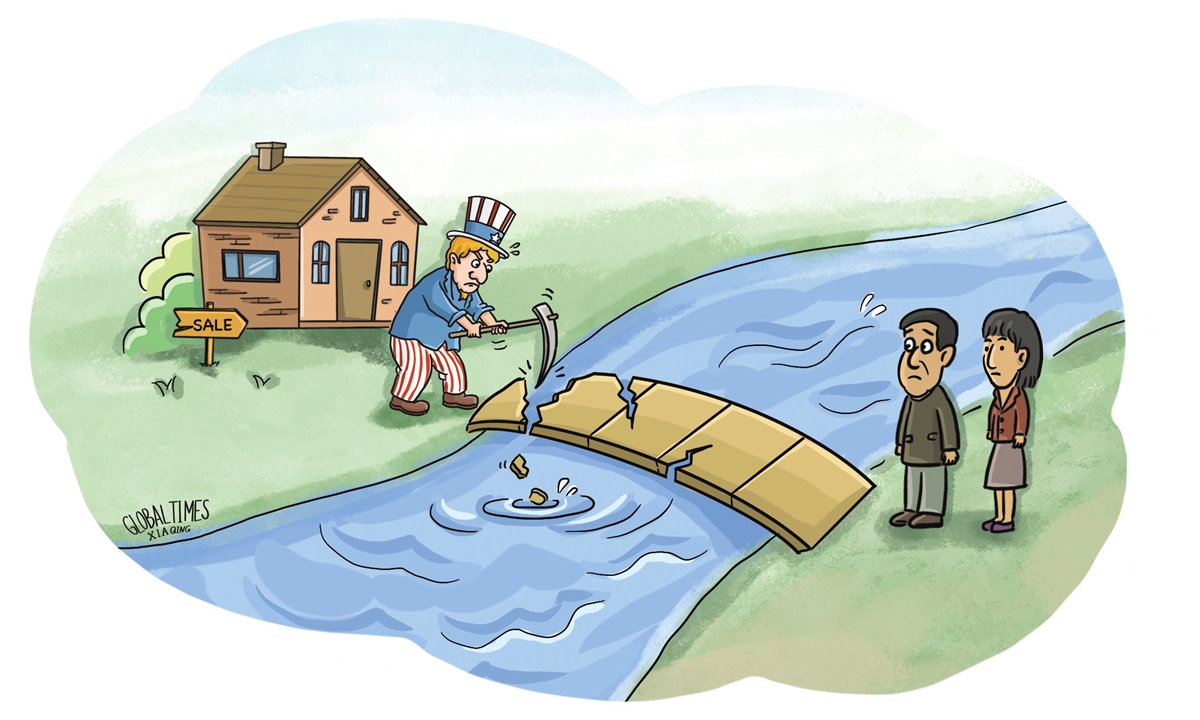
Illustration: Xia Qing/Global Times
The US' red states have recently intensified their anti-China practices. A bill filed in the Texas Senate aims "to ban citizens, governments and entities" of countries including China from purchasing land in Texas.
US Air Force reportedly shot down a Chinese company's project to build giant corn mill less than 15 miles from their North Dakota base. China expert Michael Pillsbury on Monday went hysterical, issuing an urgent warning on "Mornings with Maria" of the Fox Business, for legal action to be taken against the Communist Party of China as concerns for national security swell, "it's a very important subject and it's a good example of a larger problem," he exaggerated.
This is the anti-China hysteria of the new era. This kind of rhetoric has appeared before. In different phases, fear, exclusion, and racial discrimination targeting China or Chinese Americans have been nothing new. Now that such incidents have taken place in states such as Texas and Florida.
Recently, anti-China atmosphere or sentiment in the US has been increasingly rampant. In this context, politicians in states, especially red ones, will make every endeavor to exploit China-related issues to score political points, and to set up their labels as hawks on China in politics or policies. However, for Washington, prohibiting people with ties to China from purchasing property will evidently not help solve the current security or social problems facing the US. Instead, it will aggravate them.
It will trigger a direct impact on widening the rift in the US society, especially for Chinese Americans. They will doubt whether they can still live in the US legally, with security, safety and dignity, and their confidence in the US federal institutions will be impaired. In a short, it is not conducive to the US' social stability.
Furthermore, it is absurd to hype that Chinese's purchase of property and land in the US poses a security threat to Washington, at odds with US claims of protecting free trade of property and land as well as the spirit of openness the country promotes. The prevailing of such illogical accusations in the US indicates that against the backdrop in which anti-China is politically correct, any issue that involves China, could lose its inherent logic. And what matters more is how to use this issue to attack China.
Under the pretext of national security and ideology, Washington is attempting to provoke confrontation with China, and ramp up its suppression of China, ignoring various market principles and retreating to the old path of trade protectionism. As for Chinese companies, the US is indeed not the most ideal destination, particularly because the US government uses political and security reasons at every turn to restrict China's investment in the US by administrative means and the US' local governments are also practicing in this regard. As a result, it should be carefully considered whether to invest in the US.
Most of Washington's irrational measures come from the pretext of national security, which mirrors a loophole - in the US, it seems that national security is above all other security as well as the rights of ordinary people. For Americans, such situation is dangerous.
This is because abusing national security as an excuse to hit the legal rights of its own citizens, or other countries is obviously not the practice of a normal country.
In the US, collisions and conflicts between the notion of national security and the US democratic system are emerging, which will heavily hit the country as well as its governance. Among them, the most direct victims are the Chinese American community. When many US politicians repeatedly exaggerate the so-called China threat theory, hate crimes and violence against Chinese Americans see a rising trend, endangering the US' domestic stability. If it hopes to step out of the current governance dilemma, it needs to take off the tinted glasses in terms of national security.
Since his presidential campaign in 2020, President Joe Biden has vowed to restore global respect to the US. Judging from what his team has done in the past two years, its relevant policies are obviously completely contrary to what Biden advocated, as these policies illustrate that the US still puts the country's interests as well as the ones of some people above that of others, even at the risk of creating new anti-China hysteria.
The author is deputy director of the Department for Asia-Pacific Studies at the China Institute of International Studies. opinion@globaltimes.com.cn




